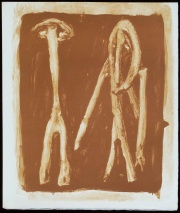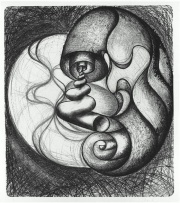Lithograph ink
Description
Oil-based inks applied as a thin, highly pigmented films to the printing paper using the lithographic process. Litho inks, also called litho varnishes, were composed of a heat-bodied linseed oil. The ink is smooth and homogeneous with finely ground particles. Litho inks vary greatly in their viscosity depending on their degree of polymerization and are sold in light, medium and heavy grades (Mayer 1969). The ink and pigments must be compatible with the vulcanized rubber used on many printing cylinders. In the 19th century many inks were diluted and extended with inexpensive petroleum products (Mills and White 1994). During the 20th century, numerous synthetic resin formulations came into use.
Synonyms and Related Terms
lithographic ink; encre lithographique (Fr.); litho ink; litho varnish; burnt-oil varnish; plate oil; offset ink
Physical and Chemical Properties
Soluble in some organic solvents. May be slightly soluble in water.
Resources and Citations
- For problems on treating some types of inks, see AIC Book and Paper catalog.
- Ralph Mayer, A Dictionary of Art Terms and Techniques, Harper and Row Publishers, New York, 1969 (also 1945 printing)
- Boise Cascade Paper Group, The Paper Handbook, Boise Cascade, Portland OR, 1989
- Matt Roberts, Don Etherington, Bookbinding and the Conservation of Books: a Dictionary of Descriptive Terminology, U.S. Government Printing Office, Washington DC, 1982
- Book and Paper Group, Paper Conservation Catalog, AIC, 1984, 1989
- John S. Mills, Raymond White, The Organic Chemistry of Museum Objects, Butterworth Heineman, London, 2nd ed., 1994
- Art and Architecture Thesaurus Online, http://www.getty.edu/research/tools/vocabulary/aat/, J. Paul Getty Trust, Los Angeles, 2000

